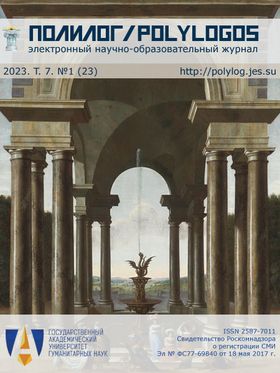
Поделиться
В первом номере журнала «Полилог/Polylogos» за 2023 год опубликованы статьи по ряду теоретических и прикладных вопросов политической науки, философии истории, методологии социогуманитарного знания, междисциплинарные исследования.
Открывающая номер статья д.ф.н. А.А. Кара-Мурзы посвящена философскому наследию Льва Карсавина: в частности, рассмотрена уникальная роль русского интеллектуала-эмигранта в осмыслении «русского коммунизма» как феномена, имеющего глубинную религиозную природу. Предмет статьи к.физ.-мат.н. А.В. Федорова ‒ современные трансформации норм права в киберпространстве в условиях геополитической конкуренции России и стран ШОС, с одной стороны, и США и ряда стран Западной Европы ‒ с другой. В статье к.полит.н. В.А. Зорина и Е.П. Очкаляса представлен политико-психологический анализ современного российского молодежного политического лидерства, основанный на результатах эмпирического исследования биографических и психологических характеристик более 100 молодых политиков современной России. К.ф.н. С.В. Пирожкова и В.В. Омелаенко исследуют основные характеристики современного процесса профессиональной социализации начинающих ученых в России в сравнении с зарубежными странами: в их статье рассмотрен ряд особенностей российской системы подготовки научных кадров в период 2010–2018 гг.
В статье М.В. Комарова и Ж.В. Лосич поднимается вопрос о рассмотрении исторического опыта поколений как фактора динамики доверия институтам; в частности, на основе гипотезы о темпоральной природе феномена доверия проанализировано предположение о доминировании в его структуре дискурсивной составляющей. М.А. Степанов предпринимает попытку восполнить недостаток работ на русском языке, посвященных хронологии развития движения «желтых жилетов» во Франции, которое, в свою очередь, рассматривается как пример социального протеста в цифровую эпоху.
Специальная рубрика номера посвящена различным аспектам российско-сербских отношений. К.полит.н. Д.А. Аникин и И.Ю. Леднёв анализируют тенденции переосмысления югославского наследия в политике памяти современной Сербии: на основе изучения законодательных актов, публичных выступлений политиков и социологических данных авторы выявляют основные направления интерпретации югославского наследия. Опубликованы также сводные материалы круглого стола «Russian-Serbian relations: opportunities and limitations», подготовленные силами экспертов-политологов МГУ имени М.В. Ломоносова и Института международной политики и экономики (Белград), автор итоговой статьи - к.полит.н. В.А. Болдин.
В рубрике книжных рецензий представлена статья к.полит.н. В.Л. Шаровой – обзор основных положений книги филолога и историка культуры Ирины Сандомирской «Past discontinuous: фрагменты реставрации», посвященной реставрации как совокупности политических, символических и духовных практик, направленных на избранные артефакты прошлого, результатом чего становится переформатирование прошлого в настоящем.
